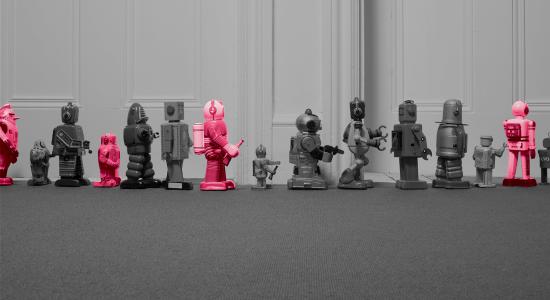HR departments are a strategic interface between management and employees. Global trends like digitization a company's human resources management must constantly realign itself. Detecon New Work experts Sophie Müller and Dr. Tanja Matt, together with Georg Pepping, HR Director at Detecon parent company T-Systems, provide insights into opportunities and challenges digital state-of-the-art technologies bring along.
Why is it business-critical for HR to keep up in times of ever-changing technologies, tools, and processes?
HR departments are a daily touchpoint for many employees. In the digitalization process, HR is co-responsible for developing a strategic agenda, i.e., a roadmap that defines how future work culture can look like based on new technologies and its implementation plan. To this end, HR needs to be in close exchange with other departments and managers. However, if HR departments themselves are not digitized enough – which is currently still the case in many companies – contradictions and internal areas of tension arise: Employees do not have access to the corresponding and supporting HR applications and services. For this reason alone, it is important to address this potential for digitization.
The external pressure on companies has also increased: The labor market is global and has changed in many areas from an employer market to an employee market. In addition, we are all using more and more digital tools, features and applications, both professionally and privately – there is an expectation that companies have to meet. Therefore, it is more important than ever to offer longtime as well as new employees a digital experience, from the first point of contact with a company. Innovative digital technologies play a significant role in this – from recruiting to onboarding to everyday work. For the next generation of employees in particular, a digital process is a must, beginning at the application stage.
Where is T-Systems on this journey? Or to put it another way: how digital is your HR?
For us at T-Systems, this change is a main topic. And of course, we advise customers on digitization issues and should be role model. This is why we are pioneering and test digital HR applications. In several countries, we are piloting Eightfold, an AI tool that uses machine learning to combine recruiting, management, and skilling. In addition, we are hosting smaller recruiting events in the Metaverse. And it's only a matter of time before training, onboarding, and even meeting colleagues take place more and more in the Metaverse or similar virtual forums. Nevertheless, the goal of digitization must not eliminating all interpersonal interaction. Corporate as well as work culture must be able to be experienced positively in both, the virtual and physical space.
Additionally, we are exploring new topics. For example, this year we have already held numerous sessions on generative AI in HR to understand the possibilities and to develop initial use cases. Our aspiration is to be pioneers and not to miss the boat.
Of all digital technologies, the Metaverse has frequently been announced as a reinvention of the interpersonal within the digital age. Can it help to overcome the challenges of HR as well?
I think that hybrid working has come to stay. Consequently, we need to strengthen the quality of both physical and virtual interaction. The Metaverse can help, but so far, technologies and their interaction are not mature enough for this. However, I am convinced that improved technology will soon bring virtual and physical space so close together that truly new use cases will become possible in the Metaverse. In the case of HR, I'm thinking not only of recruiting, but also of training and learning. Many formats that are performed face-to-face these days will then be shifted to the virtual space. Machine learning and AI will also enable individualized learning. Comparable things already exist today. For example, I learn French via an app. It measures my general progress, and also analyses my individual learning curve, with all its strengths and weaknesses, and provides targeted training for common mistakes. And that's combined with gaming elements. By using such algorithms, employees can be trained in a targeted manner and achieve both, faster and long-term success. This is precisely the kind of personalized training the Metaverse will enable in a wide variety of areas in a three-dimensional space with VR and AR elements.
Unfortunately, new technologies do not come with benefits only. What risks do we need to be aware of as we digitize HR functions?
In my opinion, the biggest threat is to focus primarily on the risks without first seeing the opportunities. Disruptive technologies such as large-language models initially provide enormous potential. And yet, they also bear some risks. That's why we need caution, we need a responsible approach to new technology. But that should not mean that we ban everything in advance. The motto should be a controlled and responsible trial and error. In addition to technology, successful digitization always requires a digital mindset, the ability to successfully combine technology, data, and IT with people and personnel in an interdisciplinary manner.
In how far does leadership has to change in order to best meet the digital transformation?
Current executives, and management in particular, are still trained in classic and often analog processes and the reflecting management- and leadership-techniques. They need to accelerate an understanding of digital technologies and their potential. We call this digital literacy. With digital, corporate leadership programs such as Level-Up, we are developing exactly this understanding, especially among managers. They will not be able to drive digitization with an analog mindset, regardless of the budget. In addition, digitization has changed the required profile of managers. They must act as coaches and “people leaders” and deal with the changed needs of their employees.
Does this create new requirements for the entire workforce?
The generation hired today are mainly “digital natives”; young people who have grown up in a digital world. Therefore, in my opinion, the topic of digital competence is predominantly relevant for current managers who were still trained in analog processes. Here, the longtime employees can benefit and learn from the skills of the new employees. Reverse mentoring, mixed-age teams and job shadowing are tools and methods that support learning from one another. So, the challenge lies in our field: As a company we need to build digital touchpoints along the employee lifecycle to be attractive to the younger generation.
In conclusion, how would you describe the HR department of the future?
HR is already often called “People and Culture” – an indicator of the growing importance of the human aspect. That is why both, a profound understanding of technology and people will be needed in the future. What can technology do, and what do people require? A colleague once said, “We have to deal with artificial intelligence, but we shouldn't neglect natural intelligence.” And that hits the nail on the head.
Employees, on the one hand, will organize themselves more and more in the future, thanks to intelligent chatbots and other digital learning assistants, such as co-assistants and co-pilots, among others. It is important to organize and prepare the internal data required for this – which includes HR data – in a data model in such a way that it can be used for the deployment of digital tools and learning systems. This also includes finding ways to link protected personal data such as HR data with publicly accessible data so that data protection, and thus employee data protection in particular, is guaranteed. We will also need to create and establish new roles in HR: in addition to Data Engineers and Data Scientists, for example, we will also need Prompt Engineers.
On the other hand, factors such as Culture are no longer just the optional icing on the cake, but a central and long-term competitive factor. In a hybrid, globalized and technologized labor world, teams will work together from different locations more often. It will be possible to access modular skills, something currently discussed as a “skill-based organization”. There will be new forms of administration that HR departments will have to build using enabling technology. In the future, there will also be new demands on HR professionals themselves. The in-depth knowledge of personnel development, labor law, change and other classic HR topics will pass from employees to generative AI. Future employees will need a deeper expertise (“I-Shape Profile”) about firstly IT, secondly data and thirdly people. And fourth, the ability to successfully combine these dimensions (“T-Shape Profile”). Only this way, HR departments will be able to offer their employees a motivating work environment, and companies remain innovative.








